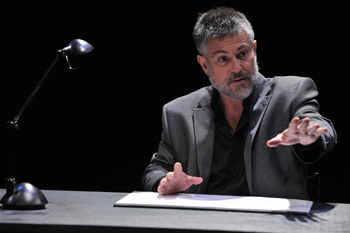Despite a few technical flaws, the Piedmont Opera‘s current production of Stephen Sondheim’s A Little Night Music is a resounding success. Great singing and orchestral playing matched by imaginative directing and lovely lighting made this a performance not to miss. The final performance is at 7:30, Tuesday March 22 in the Stevens Center in the heart of Winston-Salem.
The title of the musical is the literal translation of the popular divertimento by Mozart, Eine kleine Nachtmusik, and the plot of the musical (as well as the names of all but one character) is derived directly from the 1955 Swedish film by Ingmar Bergman, Smiles of a Summer Night. The setting is provincial Sweden at the beginning of the last century, and the season is mid-summer, when the sun sets very late and rises shortly thereafter. The subject, of course, is Love – young love, enduring love and old love – as befit the characters in this delicious musical romp.
In lieu of a formal overture, five very fine singers dressed fashionably in black, entered the stage warming up vocally in the most outrageous manner. This quintet returned frequently to comment effectively (à la Greek chorus) on the action.
The voluptuous Désirée Armfeldt (splendidly portrayed by Diane Alexander) is a faded but beautiful actress who has out-lived her luster and is now relegated to third-rate theaters in the provinces, once the lover of the widowed lawyer, Fredrik Egerman (Scott MacLeod) who has been married for the last 11 months to the very young (and virginal) Anne (Jennifer DeLatte). He sings of his frustration and hopes of marital fulfillment in the song “Now.”
The lawyer has an adult son, Henrik (Jesse Darden) who is studying theology and who quotes Martin Luther, much to the amusement of his young and desirable step-mother. To further add to his confusion and youthful torment, the household maid-servant Petra (Jennifer DeDominici) flirts outrageously with the would-be theologian, who postpones their flirtation in the song “Later.”
All three Egermanns, unfulfilled Frederik, virginal Anne and frustrated Henrik sing the trio “Soon” as father and spouse settle down for a brief nap, during which father Frederik dreams aloud of Désirée whom they will see that evening at the theater. Coming home early from the theater (Anne was “indisposed”), the couple interrupts Petra and Henrik whose disarray left little doubt as to their intentions. Under the pretext of getting a breath of fresh air, Frederik goes to find his former lover, Désirée, who welcomes him back.
The tryst is interrupted by Désirée’s current lover, the Count Carl-Magnus Malcolm, “vain as a peacock, with the brain the size of pea,” as she hints at other attributes. However, the Count is also married and shares his time between the battlefield, his wife and his mistress. The Count was sung by Michael Redding whose warm rich baritone was impressive.
We are made aware that Désirée has a teenage daughter cryptically (or suggestively) named Frederika (Kaitlyn Colbert) who lives with her grandmother, a rouée who has parlayed her virtues into a splendid house in the country, complete with stables and servants. Madame Armfeldt (Robin Voiers) is confined to a wheelchair and speaks of death as the only other truth.
Désirée hatches a grand plan to invite all the characters for a “Weekend in the Country,” at her mother’s estate, including the Countess Charlotte Malcolm, the embittered and all-knowing wife of Count Carl-Magnus. The Countess Charlotte, beautifully sung by mezzo-soprano Janine Hawley, delivered some bitterly funny one-liners following her song about “Every Day a Little Death.”
The entire second act takes place in the country and is a delight as the machinations and plans hatched by Désirée comes to fruition as youth claims its own, Count returns to Countess, and old lovers are reunited. In a delightfully belted song that elicited cheers from the audience, even Petra finds her solution:
“In the meanwhile
There are mouths to be kissed
Before mouths to be fed…”
Michael Shell, Stage Director, made the most of minimalist sets, relying on moveable props (beds, sofa, tables, picnic blankets and wheelchairs) and exquisite lighting (Norman Coates, Lighting Designer) to create continuity in the two long acts. Even so, there were a couple of moments where the slender thread of dialog between two actors threatened to stop dead. Fortunately, Sondheim always has something up his sleeve to revive the audience.
Of course, the show-stopper is the only well-known tune from the musical, “Send in the Clowns,” sung in a low register by the nearly hopeless Désirée, and reprised later. It is a truly beautiful song and well worth waiting for. Maestro James Allbritten led the entire ensemble with clarity and strength, even while the audience chattered through the intermezzo leading to the second act.
Overly dim lights in the balcony made it impossible to read the program and the helter-skeltered arrangement of the playbill compounded the difficulty. Whereas the spoken dialog was almost always clear, the diction of the singers was not, and we missed the supertitles we have become accustomed to in opera productions.
For information on the upcoming performances, see our sidebar.











